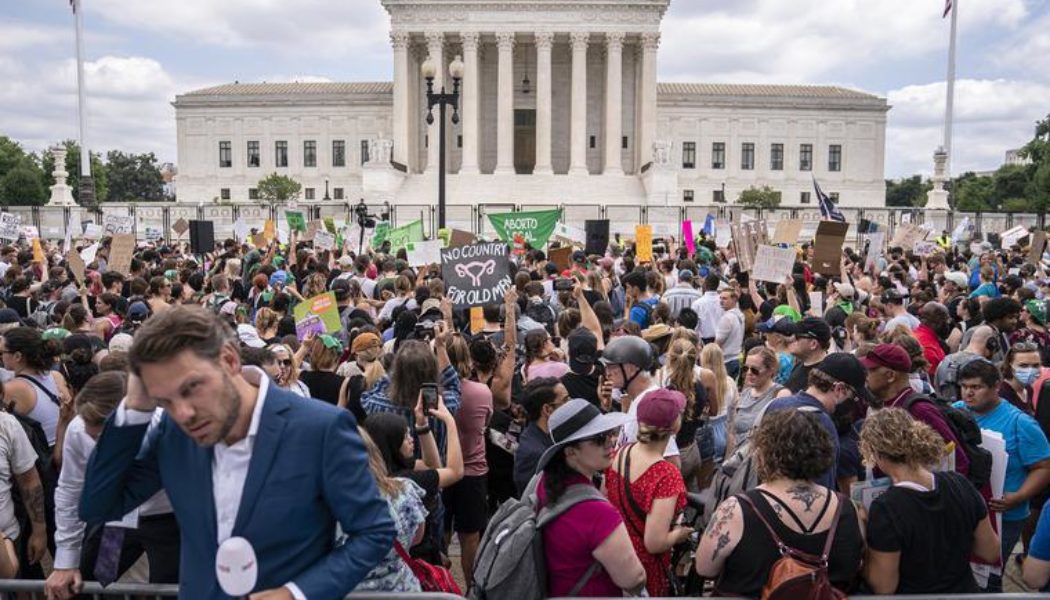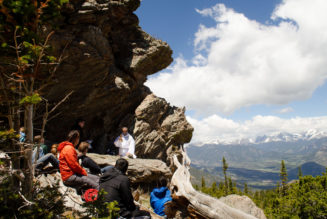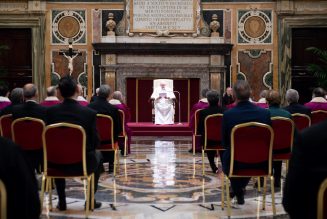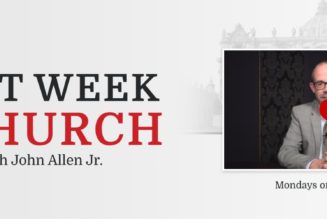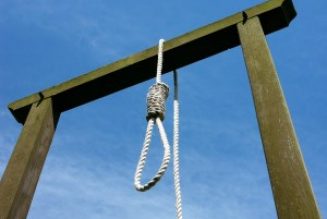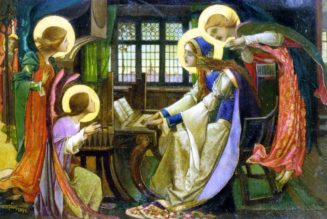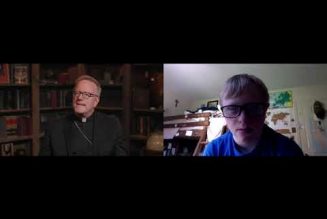
Below is a trancript of the show, which was recorded the day of the Dobbs v. Jackson Women’s Health decision:
[00:12] Jeanette DeMelo: The Supreme Court on Friday, June 24 — the Solemnity of the Sacred Heart of Jesus — overturned Roe v. Wade that created a so-called right to abortion. The justices ruled in a 6-3 decision in favor of the Mississippi abortion restriction law in the case Dobbs v. Jackson Women’s Health. Today is an answer to many pro-life prayers, and the prayers must continue as our states now face the proper democratic and legislative process to protect the unborn and serve women and families. EWTN’s Catherine Hadro and Lauretta Brown join us with reactions to the news. I’m Jeanette DeMelo, editor-in-chief and executive director of the National Catholic Register, and your host for Register Radio.
Catherine Hadro is known to many in our audience. She’s the founding host of EWTN’s Pro-Life Weekly. She’s currently in Rome where she is an EWTN host for live coverage of the World Meeting of Families. What an incredible moment we are living in, Catherine. What is your reaction to this news?
[1:18] Catherine Hadro: I am stunned. I am in awe of God’s mercy and his perfect timing. I feel emotional at times because I think this is a day … a lot of us wondered, would we ever see this day? We hoped for it. We prayed for it. And to give a personal anecdote, Jeanette, I was anchoring live the coverage of EWTN’s World Meeting of Families from St. Peter’s Square when this news broke. And so for us to get this news and then break that news live to our EWTN audience as the bells in St. Peter’s Square rang behind me on the Solemnity of the Sacred Heart — I was just like, “Jesus, you designed this and you planned for this day. You knew this day was going to happen.” And again, just a reminder to always trust in our Lord.
[2:16] Jeanette: Absolutely. You know, Catherine, my team this morning — we’re recording this on Friday, the day the decision came out — we were all waiting. And we held the paper — we usually go to press on Thursday — but we held the paper because we just hoped it would come. And sure enough, somebody this morning said, “Hey, wouldn’t it be providential if it came today on the Solemnity of the Sacred Heart?” And indeed it did. So I think all of us are just thanking Jesus for this and entrusting all of these unborn and all of these women and families who have been affected by abortion or have contemplated it (or will contemplate it even in the future) to the Sacred Heart. He is in control and we as Catholics in the pro-life movement can absolutely give him the praise. I was thinking, Catherine, of the two guests — you and Lauretta — and myself. We have grown up under the rule of Roe. We know nothing else. So this is really a strange moment for us. What do you think we can expect now?
[3:20] Catherine: You know, I 100% agree with you. That’s why I think we’re still kind of wrapping our heads around this moment. And in a way, that Dobbs leak that happened in April gave us some time to process this. And as we’ll be looking through the Supreme Court decision and comparing it to the leak, I think it is essentially the same. We had the opportunity a few weeks ago to start processing this news and to start planning for it. I do think, Jeanette, that we are going to see in our nation a lot of rage — a “night of rage,” as abortion advocates are calling for it. I suspect that local Catholic parishes hopefully should be thinking seriously about security in these immediate Sundays and these immediate weeks. There’s going to be a lot of misinformation swirling around mainstream media — which, frankly, speaks to the need for the National Catholic Register and Register Radio all the more to clarify all those misconceptions.
[4:22] Jeanette: Absolutely. I feel the same way — that the misinformation is really tremendous — and I think we should clarify right now: This does not make abortion criminal across the United States. This actually makes the states responsible for abortion laws and up to 20 states could have, or do have, trigger laws which would ban abortion. Not immediate — there’s some period of time in which that gets enacted. (Lauretta Brown will talk a bit about that in the second segment.) But we need to to clarify that this doesn’t mean that a woman who seeks an abortion is suddenly a criminal. That’s just not the case. And I also think the role of these pro-life pregnancy centers, which are right now in many places being attacked, needs to be lifted up, because their hope is to provide women other options, and to accompany them throughout the journey of having a baby and even into parenthood. So that’s a very important aspect of the movement now that we really need to lift up. It’s always been an aspect, but it’s a huge part now.
[5:34] Catherine: I think a lot of listeners may be wondering, “Now that this reality is here — Roe is reversed, Roe is overturned — what do we do now?” The first thing I tell people is: Reach out to your local pregnancy care center. Ask them, “How can I help?” Is it financially, perhaps? Is it with your time? Is it donating diapers? I know there are pregnancy centers … sometimes they just need metro cards and bus passes — practical means to serve women. And again, it is pro-life pregnancy care centers that are on the forefront of helping women, and yet they are under violent attack in some places and they are being targeted by abortion advocates. The same people who claim we are anti-woman, who claim we are only pro-birth, are attacking the very centers that prove we are very much otherwise, that prove we are on the side of women and accompany women.
[6:26] Jeanette: That’s right. You know, Catherine, we have this really nice piece — great analysis by Gerry Bradley, a constitutional lawyer who’s written for the Register before. But he wrote about how this moment is built upon half a century of dedicated work from pro-lifers. Like there could be any number of lawyers who could have argued well to overturn Roe. But really, we’ve gotten to this moment because of the pro-life movement, and Catholics were at the forefront of that. That’s another beautiful thing to just give witness to Jesus in the Sacred Heart. What’s your reaction to that?
[7:11] Catherine: I mean, the Church has been the steadfast voice on the life issue. I think that’s exactly why we are seeing Catholic churches being targeted here — because we have been. That doesn’t mean we back down, though, from our witness, and back down from the truth. We need to continue to stand strong there, to continue to be a light. You know, we’ve been talking about how this announcement came on the Solemnity of the Sacred Heart.
If it was not this Solemnity, June 24 is typically the Nativity of John the Baptist. So from here on out, the anniversary of the Dobbs ruling will be on the Nativity of John the Baptist, who we know was the first person to recognize Jesus in Mary’s womb when he himself was in the womb. I have the chills as I say that to you. Because again it speaks to “Lord, you planned this perfectly.” And I love that it was … Jesus chose to use his Sacred Heart to heal our nation in this way.
But you’ve made a very good clarification, Jeanette, that this does not mean … yes, this is good news for Roe to be reversed. … This does not mean an end to abortion in the United States. I said this on-air at one point and I’ll say it again: This is not the beginning of the end; this is the end of the beginning. We are still in the starting stages of having to serve women and children in need. And now we have 50 different landscapes about what that looks like. And we have a lot of work ahead. So in the pro-life movement we celebrate, but we also need to maintain momentum here.
[8:40] Jeanette: Absolutely. I couldn’t agree with you more. And Catherine, I thank you so much for taking the time to be with us today on this very important day. I join with you in the prayers and in the thanksgiving and I ask our listeners to really do the same. Let’s continue to offer all women, all babies, all families to the Sacred Heart. Thanks so much, Catherine.
[9:07] Catherine: God bless you. Thank you for your coverage.
[9:10] Jeanette: This is Register Radio on EWTN. Stay tuned. We’ll be joined after the break by Lauretta Brown with continued coverage of the overturning of Roe v. Wade.
[9:21] BREAK
[10:33] Jeanette: Welcome back. I’m Jeanette DeMelo, executive director of the National Catholic Register, and I’m joined by Lauretta Brown, our national correspondent. Lauretta, what a day! A day that we’ve been waiting for, really, our whole professional lives, because you and I have grown up in the Roe generation, right? I mean, we were born after Roe, and so this is the only law of the land that we’ve known. And growing up in pro-life families, it’s always been something dear to our hearts — to work to protect the unborn and to to serve women better than abortion. So what’s your reaction today?
[11:19] Lauretta Brown: It was just so stunning in some ways to see the words, “Roe has been overruled.” And after that, it was gratefulness, and it was kind of the acknowledgement of all the work the pro-life movement has done to get to this place and just looking over that decision and taking it all in of the reasoning there that, you know, over the years, I’ve heard a lot of these points made by pro-life historians and writers and people in the states that wanted these different limitations and to see that the Supreme Court has finally recognized all of that and seen that. And we’re at this place now where Roe’se overruled. It’s amazing. It’s just quite the milestone moment for the pro-life movement.
[12:10] Jeanette: Exactly. It’s a bit breathtaking. We have a piece — and I mentioned it in the last segment — by Gerry Bradley. The title of that piece — I didn’t mention it then, but I’ll mention it now — is “Dobbs Decision a Monumental Moment in the March for Equal Rights for Every Human Life.” And you know, he makes the case in his opening line (“The nightmare is over”) that Justice Samuel Alito consigned the constitutional right of abortion to the ash heap of history. Big words by Gerry Bradley, and he really … he just rips into the original Roe v. Wade decision and how Samuel Alito is correct in his opinion. And the opinion didn’t change much from what was leaked back in May. But it’s interesting how the Court really broke down in this decision. It was a 6-3 decision in the Dobbs v. Jackson Women’s Health. Right? So explain to us a little bit, kind of the logistics of what happened today.
[13:15] Lauretta: Yeah, certainly. So we did see from Justice Alito that opinion — that is essentially the same as the draft opinion that was leaked — just taking aim at Roe and the reasoning there, the historical reasoning, the way it interpreted the Constitution.
[13:33] Jeanette: So, Lauretta, it was a 6-3 decision in the Dobbs v. Jackson Women’s Health, which is a case out of Mississippi. So it’s important to kind of contextualize what the decision was. And of course the decision related to Dobbs then overturned Roe. But the details are quite interesting, because people didn’t naturally fall along certain lines. Chief Justice Roberts was kind of off on his own. So tell us what happened.
[14:06] Lauretta: Yes, certainly. So we had the 6-3 decision here, and as you say, Chief Justice Roberts joined with Justices Thomas, Kavanaugh, Alito, Barrett, Gorsuch — and in this decision by Alito that we had kind of seen in the draft opinion, with some of the responses to dissents in there now added.
And so another part of that, though, that just really made this interesting too was … so Chief Justice Roberts wrote his own concurring opinion and Justices Thomas and Kavanaugh also wrote concurring opinions, kind of going into some of the details of this — of what this will mean and why Roe was not well-reasoned. And so Chief Justice Roberts, he talked about how he would have preferred upholding the 15-week law but leaving Roe in place and just giving … women time, reasonable amount of time, to obtain an abortion. And he didn’t see why 15 weeks wasn’t a reasonable amount of time. And that would be the new standard — that’s where he would have preferred to leave things — and he didn’t get agreement from the other justices on that. So he was in the opinion overruling Roe.
And then Justice Kavanaugh actually talked about how this is just returning the decision-making to the states — that they’re not banning abortion nationwide and they’re not requiring any particular law on abortion nationwide. They’re letting the states make these decisions now. And so he really emphasized that, in light of maybe some people reacting saying, “This bans abortion,” saying, “No, that’s really not what we’re doing here.”
[16:02] Jeanette: Right. You know, Helen Alvaré, in an analysis piece that she did for NCRegister.com, really expressed deep disappointment in Justice Roberts. Because while yes, he voted with the majority so that it could be 6-3 on the Dobbs case itself, his opinion basically says he would not have voted outright to overturn Roe. So Roe was really overturned by a 5-4 majority in a way. That’s not the way it says it in the court documents, but essentially he didn’t want to overturn Roe in this particular manner. That’s something to note. And it’s a very disappointing action, or opinion, by Justice Roberts. Helen Alvaré’s piece is very much worth reading. It nearly made me cry. It was so powerful. It’s called “Roe Overturned: A Wonderful Day for Democracy.” And she really does go into the analysis of the different justices and why this decision was laid out. You mentioned that you were able to read through the full document. What were some of the reasonings that stuck out to you?
[17:30] Lauretta: Well, it was really interesting to see that … I had looked a lot at the history of abortion in the U.S. at one point, because that was such a focus of the draft and such a focus now with the official decision here, and how abortion was not a common practice or by any means a right in the common law or in the United States at the time of the 14th Amendment. And that was really a point that Alito drives home. And one thing that stuck out to me there was the dissenting opinions — they didn’t address that. And Alito was able to note, “Yeah, they’re not even trying to say that there’s a historical right here.” So they didn’t really tackle that part of it. They just sort of made a comment of, “Well, looking at it just at the time of the 14th Amendment is one snapshot of the time period, and we can look beyond that at what women need and what their rights are, how that can be interpreted.” But they didn’t have the historical argument that many were trying to make initially.
[18:42] Jeanette: So it is quite interesting, all of that about the historical basis. And again, I think I encourage our listeners to actually read the decision. It is so — I guess I should say Alito’s opinion — it is so well laid-out and so clear. It really does tackle the history of abortion in our country and it sets the record straight because so much of that history was really manufactured by poor information and by activists, quite honestly.
So, Lauretta, I had intended to talk today — before I knew that the decision would come down — about what happens now. And you’ve written about that for our audience. Just give us a preview of what’s the law of the land now. Where are we?
[19:35] Lauretta: Yeah, yeah, absolutely. And this is why I was so … the opinion from Kavanaugh kind of struck me, because this goes back to the states. So these battles and these discussions are going to be happening in the states. And already I’m seeing the headlines of these trigger laws. So South Dakota, Louisiana, Kentucky, have made abortion illegal now. So they had these laws in place that once Roe was overturned, they were prepared. And I had just done a story, actually, on where the states are positioned — what those pro-life efforts in the states might look like. And so a little over a dozen states, very soon now — I mean it’s all happening so quickly, but in the next couple of days — are going to just have abortion be illegal because of these preparations they made. And then I think, ultimately, it’s anticipated that a little over half of the states will move to make abortion illegal or limited to the first six weeks. So that’s one side of it. But then there are also these states that are adding a right to abortion in their constitution and becoming, they call it, “abortion havens.” And even having funds for women to travel to their states to get abortions. So yeah, it’s turning into a debate and a battle in the states over this. And pro-life efforts very much are continuing and need to continue on this state level.
[21:08] Jeanette: Right. Lauretta, you are in Washington, D.C. (We’re just about out of time.) Have you been monitoring whether or not there’s been violence today? I know tonight everyone is bracing for what a group — kind of almost an abortion terrorist group, it’s called Jane’s Revenge — is calling for a “night of rage.” What have you seen in D.C.?
[21:29] Lauretta: I’ve seen very loud protests outside the Supreme Court that are increasing in volume and intensity. Haven’t directly seen violence yet, thank goodness. But I mean, people are very upset and they’re very vocal about that, and you know, hopefully that doesn’t escalate to violence. But definitely something we’re all watching.
[21:51] Jeanette: Absolutely. And we will pray for that. Our listeners can also check out online our Publisher’s Note by Michael Warsaw — it’s called “True Democracy!” And please, everyone, join me in prayers of thanksgiving, but also prayers for peace and safety. Remember, for more news analysis and commentary, check out the National Catholic Register online at NCRegister.com. Thanks for joining us on Register Radio here on EWTN Radio. For our producer, Jeff Burson, and myself, Jeanette DeMelo, I ask God to bless you and may the Most Sacred Heart of Jesus reign!
Join Our Telegram Group : Salvation & Prosperity
